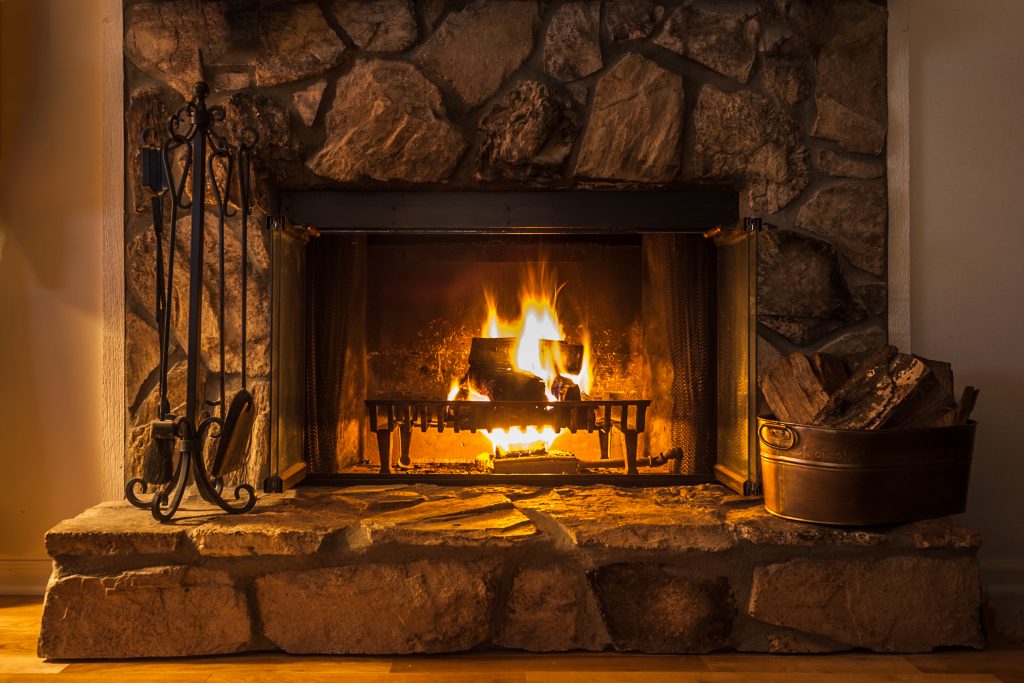Chimney Service, Fireplace Safety and Insurance FAQs

Your fireplace is a major focal point in your home. Unfortunately, if you’re not careful, it can also become a major hazard. Over time, ash, creosote, and carbon residue build up in fireplaces and chimneys. Left unchecked, these biproducts can result in fires or carbon monoxide intrusion.
Some chimney fires go completely undetected, all the while doing damage to your home’s structure (masonry, flashing, etc). Dirty chimneys can also create visible, fast-moving fires that spread into your house, along with hazardous smoke and fumes. Read the following FAQs on chimney service and fireplace safety to protect your house this winter:
How often should I have my chimney serviced?
Believe it or not, experts recommend getting a chimney inspection every year—ideally halfway through the heating season. The inspector can advise you on sweeping or other service needs.
How often should I have my chimney swept?
Your chimney sweeping needs will depend on how often you use your fireplace, its age and condition, and other factors. If you’re following the rule of getting annual inspections, you won’t have to worry about whether or not you’re overdue for a chimney sweep. In some cases, cleaning is required annually or even more than once a year.
Does insurance cover chimney fires?
Every case is unique, but just like your roof, your plumbing, etc., your chimney is a part of your home that insurance companies expect you to maintain. If you can prove you’ve made a reasonable effort to clean your fireplace and chimney, you’re more likely to have a claim approved if something ever goes wrong. For more answers to MA home insurance questions, call our expert team: 508.339.2951.
What does chimney sweeping cost?
The average chimney sweep job costs $227, according to data from HomeAdvisor.com. Your job may cost more or less, depending on where you live, the condition of your fireplace (i.e. how long it’s been since your last cleaning), the pitch of your roof, and other factors.
What if we don’t use our chimney? Do we still need to inspect it?
When money’s tight or life gets busy, it’s easy to neglect home maintenance items like chimney service. In the meantime, maybe you’ve decided not to use your fireplace, or use it very sparingly. Still, you should keep in mind that your flue may be in use any time you activate the furnace, boiler, or water heater. You’ll want to know that it’s working properly (with no critters nesting inside).
How can I find a good chimney service/chimney sweep near me?
To ensure you’re getting expert advice and service, it’s a good idea to look for a CSIA-certified chimney sweep. These professionals complete rigorous training/education in order to earn their credentials, and they are held to a strict code of ethics. You may also want to check a provider’s Google/Yelp/Facebook reviews to see what past clients are saying. Finally, you may want to request quotes from several companies—especially if an inspection reveals major problems and repair needs.
Which wood should I burn in my fireplace?
Most folks who own a fireplace know to only use dry, seasoned wood. Oak, hard maple, and birch—dried for at least one year—are ideal fireplace wood. Softer woods (like pine) may ignite faster but may also pop with sap, burn out faster, and leave more ash residue in your fireplace.
Are there things you shouldn’t burn in a fireplace?
Yes, lots! Here are a few of the common (and dangerous) items people tend to think they can burn—especially during the holiday season, when there are so many extra boxes and wrapping materials around. DO NOT burn any of the following:
- Christmas tree branches
- Wrapping paper
- Pizza boxes
- Chemically treated wood
- Plastic or Styrofoam
- Trash
- Anything with colored ink (e.g. magazines, Christmas cards, sales fliers, and coupons)
What other chimney services should I ask about?
Ask your chimney service provider about cleaning your dryer vents, too. According to the U.S. Fire Administration, nearly 3,000 home fires occur each year as a result of clothes dryers. Failure to clean the dryer vent is a leading cause of these incidents, which tend to peak during cold-weather months. Remember that many homes have long vent ducts (requiring special tools for proper cleaning). Rather than do it yourself, it’s a good idea to ask your chimney service professional about cleaning and inspecting dryer connections along with your annual chimney inspection.
